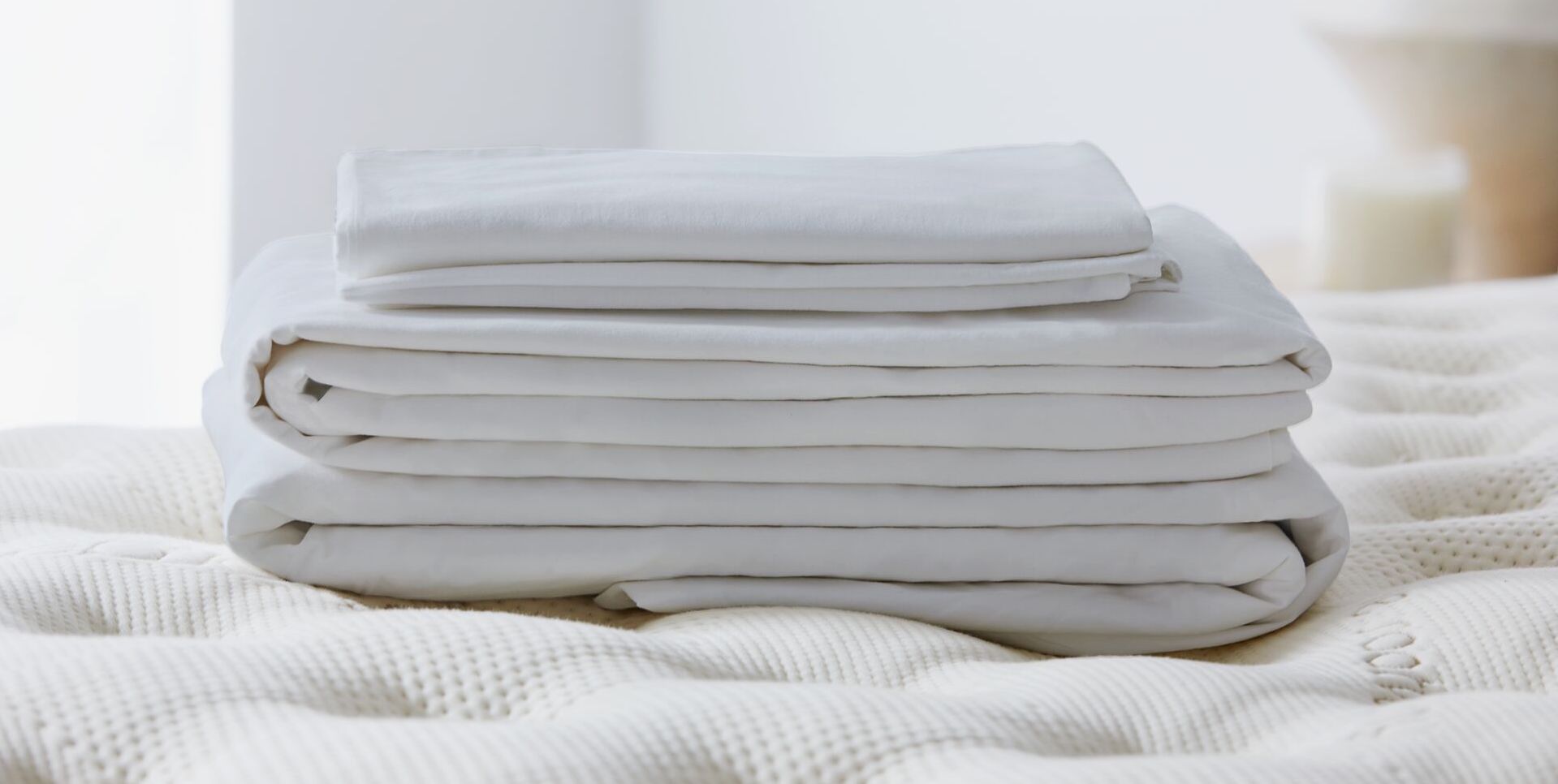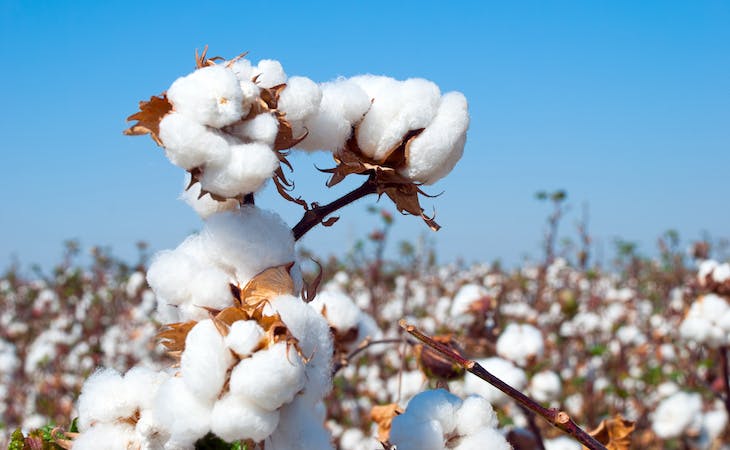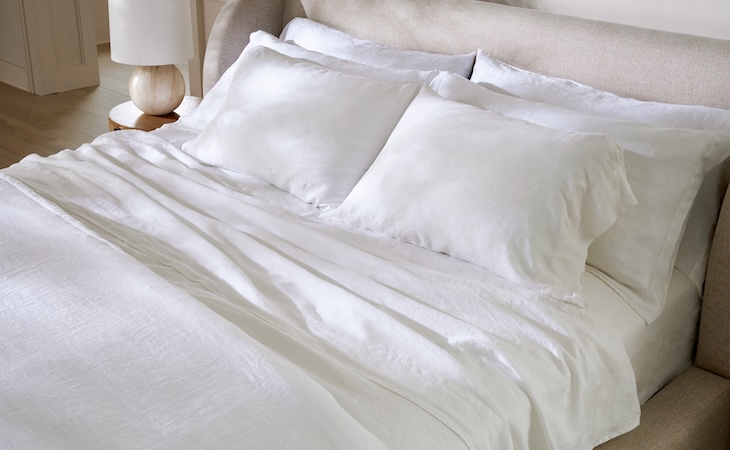Cotton is the most popular fabric in the world, accounting for more than half of all the fiber used to make clothing and household items—including bedsheets. High-quality cotton is soft, breathable, and durable.
There are two options within the cotton category: conventional cotton and organic cotton. This article will explore the differences between organic cotton vs. regular cotton so you can decide which one is right for you.
What is organic cotton?
Organic cotton comes from the same plant as regular cotton. But it’s grown without the use of synthetic pesticides, artificial fertilizers, or other toxic chemicals. It requires less water to grow than regular cotton and is handpicked rather than picked by machine, which can damage the fibers.
Organic cotton certification
U.S. law requires that to be certified “organic,” cotton can’t come from genetically modified (GMO) seeds. GOTS (Global Organic Textile Standard), the leading worldwide textile standard, and OEKO-TEX Standard 100 are certifications for organic cotton.
To have the GOTS organic certification, products must contain at least 95% organic fibers. A product may still have the GOTS certification if it contains at least 70% organic fibers, though it won’t be considered organic.
The OEKO-TEX Standard 100 oversees the textiles in a particular product, but it doesn’t mean the product is organic. It does mean the item is chemical-free. You’re best advised to look for both of these certifications when looking for organic cotton products.
What’s the difference between organic cotton vs. conventional cotton?
There are three main differences between organic cotton vs. regular cotton:
- How the cotton is grown
- How the cotton is watered
- How the cotton is produced
How the cotton is grown
Cotton is grown either in dryland or irrigated. Dryland cotton requires rainwater, while irrigated cotton draws from underground water sources. Extensive irrigation depletes the soil of minerals, which requires the use of fertilizers to replenish the lost minerals.
Organic cotton is grown using sustainable practices such as rotating crops, rather than depleting the soil by planting the same crop on the same land, year after year, and using chemical fertilizers to replace its lost minerals.
Conventional cotton uses up to 25% of all the pesticides used in farming. These pesticides have been linked to a variety of health issues. Instead of pesticides, organic cotton is protected from bugs by the use of other insects that kill those bugs.
Organic cotton farmers handpick their crop, which protects the cotton fibers against the damage that machine-picking can do to the conventional cotton that’s usually picked this way.
How the cotton is watered
Organic cotton is mainly watered with rainwater, saving thousands of gallons of water typically used to irrigate regular cotton that depletes the soil in which it’s repeatedly grown.
Conventional cotton uses about 1,320 gallons of water to produce one pound of cotton. This translates into requiring 713 gallons of water to produce a single cotton T-shirt.
There’s some debate as to whether organic cotton uses less water, but the fact is that 75% to 80% of organic cotton is rain-fed. Not using chemical pesticides and fertilizers on organic cotton helps protect groundwater and the rivers and lakes into which it runs.
How the cotton is produced
Regular cotton is typically produced using a large number of chemicals, including heavy metals, chlorine, and chemical dyes. These products can still have chemical residue after washing them, which can cause skin allergies.
Organic cotton, on the other hand, uses safer alternatives to chemical dyes and whiteners. These include natural or water-based dyes and peroxide for whitening.
And because Fair Trade practices and organic products often go hand-in-hand, you can be sure organic cotton was produced on farms and in factories with humane working conditions and reduced risks to workers. Raw materials also can be traced to their origins so these standards are upheld during every step of the production process.
However, there is conventional cotton out there that’s ethically sourced and certified to be free of harmful chemicals. Look for third-party certifications like the OEKO-TEX Standard 100 to ensure conventional cotton meets the highest standards for quality and safety.
FAQs
Is there a difference between organic cotton and cotton?
Although organic cotton and conventional cotton come from the same plant, they differ in how they’re grown, watered, weeded, harvested, and manufactured. Organic cotton tends to be more eco-friendly, but both organic cotton and regular cotton are soft, breathable, and durable.
What are the disadvantages of organic cotton?
The main disadvantage is that, because it costs more to grow and produce organic cotton, products made from it likewise cost more too.
Is organic cotton better than regular cotton?
It really comes down to personal preference. Organic cotton isn’t necessarily better than high-quality conventional cotton, but it can be more eco-friendly and sustainable. Regular cotton, on the other hand, tends to be less expensive than organic cotton. Both choices are soft, breathable, and durable.
Shop high-quality cotton sheets at Saatva
You can find a variety of cotton sheets at Saatva, all of which are made with the highest quality, durable cotton that’s free of harmful chemicals and irritating dyes. Choose from our

Organic cotton sheets with a timeless elegance
,

Crisp and cool percale cotton sheets with a luxe matte finish
, and more that all meet the highest standards for quality and safety.





